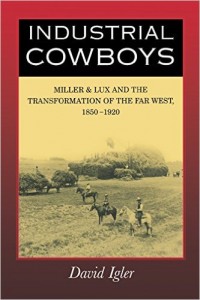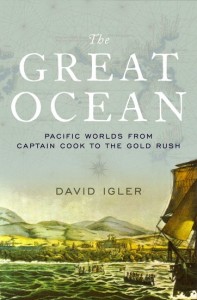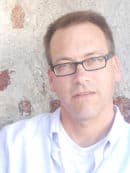How Did Water Connect the World? An Interview with David Igler on Pacific and Environmental History
The Pacific is an area largely understudied by historians, yet it is "an ocean covering more than a third of the Earth's surface" and has "over 25,000 islands", to borrow the words of the late Australian historian Greg Dening. In the past thirty years or so, a growing number of historians have shifted their attention to the Pacific. This includes such well-known scholars as Greg Dening, Anne Salmond, Gregory T. Cushman and Toynbee Prize Foundation Trustee David Armitage.
Our most recent guest to the Global History Forum, Professor David Igler, numbers among the dozens of scholars who believe in the importance of Pacific Ocean and significance of environmental history. David Bruce Igler is a historian of the American West, President of the Pacific Coast Branch of the American Historical Association, and Professor of History and currently Chair of History Department at the University of California, Irvine.
Professor Igler, a graduate of UC Berkeley, began his academic career as a U.S. historian specializing in the American West and environmental history. After publishing his book Industrial Cowboys: Miller and Lux and the Transformation of the Far West, 1850-1920, he decided to explore the waterscape and regions west of the West, namely, the Pacific Ocean. This research has consumed him for the past decade. The product is, The Great Ocean: Pacific Worlds from Captain Cook to the Gold Rush, was published by Oxford University Press in 2013.
The prize-winning monograph draws on hundreds of documented voyages, some painstakingly recorded by participants, some only known by their archeological remains or indigenous memory. This leads to a window into the commercial, cultural, and ecological upheavals following the initial contact period, in the eighteenth and nineteenth centuries. Do industrial development and environmental transformation often happened in the same time? What makes Professor Igler shift from American history to Pacific history? Can humans have a dialogue with the Ocean? Professor Igler and Tiger Li, Editor-at-Large for the Toynbee Prize Foundation, discuss these questions in the following interview.
Tiger Li (TL): Professor Igler, when did you become interested in history?
David Igler (DI): Certainly not before I left home for college! Unfortunately, my high school history teachers were uninspiring, which is one reason I encourage my best undergraduates to seriously consider teaching as a career—we need well-trained and inspiring teachers. I've had a number of successes with our strongest history majors entering the teaching profession. But to answer your question, during my first semester in college, I decided to take two classes in African-American history simply because it was an area of history I'd never encountered. The professors—Robert O'Meally and Clarence Walker—exposed me not only to African American history and culture, but also to an intellectual world I didn't know existed. Ultimately, I majored in American and African-American Studies because of the fascinating intersection of history, literature, culture, and film. In the end it was the history that most attracted me within this interdisciplinary study.
TL: Did you always know you wanted to pursuit PhD?
DI: Not at all. I'm a first-generation college student, and there's very little in my background that would have naturally led to the pursuit of a doctoral degree. At various times I thought about a career in journalism or teaching. It was the example of my professors at Wesleyan University that made me think about doctoral programs and academia. Those professors seemed to have a marvelous life of publishing, teaching, and professional engagements; they embodied the life of the mind and they also had full lives beyond their work. Don't get me wrong; the professoriate is filled with people who do not have well-rounded and rich lives, but the people who mentored me were remarkable examples of professional success and happiness.
TL: You received your PhD training from UC Berkeley; could you share some stories with us from when you were undertaking your postgraduate studies at UC Berkeley?
DI: I entered Berkeley as a fairly naïve first-year doctoral student. Even though I had a Master's degree and knew how to work hard, I was not raised in an academic environment and therefore didn't understand much about the customs, expectations, and language of academia. I remember the initial class meeting of our research seminar for first-year doctoral students; fifteen students in the class arrived with well-constructed research ideas and archives they would utilize, while I had neither a clear plan for research nor a useful archive. Fortunately the professor—who would eventually become my dissertation advisor—quickly got me up to speed, and it all turned out well.
On the other hand, I have some very fond memories of incidences in graduate school. During my second year of study, [University of Wisconsin historian] Bill Cronon came to campus and spoke at a forum on American environmental history. One of my committee members had organized the event and she asked me to help shuttle Bill around campus. His book Nature's Metropolis had just come out, and there were few people I respected more in the field of environmental history. He was entirely gracious with me—this young guy who could only parrot his ideas even on a good day. It was probably moments such as this one that made me feel engaged with the larger profession.
TL: In the beginning of your academic career, you tend to focus on studying American West, is this related to the fact that you were born and raised in California?
DI: You're right to a degree because there's something about leaving the place one is born and raised that generates intellectual interest in it. Attending a college on the East coast made me think (perhaps for the first time) about the American West as a place; it was also in college that I took classes with Richard Slotkin, one of the premier American Studies scholars who wrote about the American West as myth and symbol. His books, beginning with Regeneration Through Violence, influenced my thinking about the West in a very profound way.

TL: Your first book, based on your Berkeley PhD thesis, Industrial Cowboys: Miller & Lux and the Transformation of the Far West, 1850-1920, is an excellent study about illuminating the industrial development and environmental transformation of the American West during the late nineteenth and early twentieth centuries. In your view, do industrial development and environmental transformation of often happened in the same time? Does industrial development often cause environmental problems? Who has the power to regulate these processes?
DI: Industrial Cowboys focused on one massive corporate entity, but it also attempted to address the larger picture of western industrialization. The early firms in the West were mostly extractive industries—mining, timber, land development, irrigation, and so on. As such, the industrial process focused on natural resource extraction and what I called "engineering" the land for market production. Large labor forces played the same role in these industries as they did in the better-known industrial factories of the East. The relationship between industry and nature was incredibly close in the West: industry was utterly dependent on the natural surroundings and the environmental impact was severe.
One can make the same argument for other forms of industrialization, such as factory production of textiles or steel, but the relationship to nature is more veiled and less direct. However, if viewed closely, we can still see the linkages between nature and industry. A good example of this would be mid-19th century textile production in New England, which depended on cotton production in the slave South and also the whaling industry in the Pacific. Much of that whale oil from the Pacific found its way to textile factories, where is literally greased the machinery of American manufacturing.
TL: The Great Ocean: Pacific Worlds from Captain Cook to the Gold Rush is a very influential book. Could you tell us what happens you shift from American history to Pacific history?
DI: First of all, I would question the underlying assumption in this question that US history is separate from the Pacific. I could teach an entire survey course of US history that never strays far from the Pacific. That said, I understand what you're asking. I suppose at a certain point I grew tired of the regional and national ways of framing history, and then I took a job at UC Irvine where many faculty are leaders in transnational, comparative, and World history. I began reading scholars like Greg Dening, Anne Salmond, and Epeli H'au`ofa, and their works literally blew my mind. It was similar to beginning graduate school all over again. There was also something very fresh about studying the Pacific, at least as a U.S. historian, because so few of us had given the Pacific much thought in contrast to all the scholars who studied the Atlantic. It's almost as if the Atlantic—and its notable exchanges, migrations, and the slave trade—gave birth to American history, while the Pacific rarely entered into academic discourse and certainly not popular histories (except for World War II).
 TL: In your book, you mentioned many stories of many Western sailors in the eighteenth and nineteenth century, what languages do they speak when they meet the indigenous people?
TL: In your book, you mentioned many stories of many Western sailors in the eighteenth and nineteenth century, what languages do they speak when they meet the indigenous people?
DI: They probably speak their native language (English, French, Russian, Spanish) and then rapidly become frustrated by the lack of response. But that's a glib answer to an important question. Obviously it depended on how much exposure the two groups (or multiple parties) had previously shared. Indigenous groups seemed to learn European languages or at least key words very quickly; the reverse was not always true. At one point James Cook confessed that communication with indigenous groups was incredibly muddled—miscommunication was the likely outcome, which led to misunderstandings and often violence. I'm currently researching a man named Kadu from the Caroline Islands who had never met Europeans before joining a Russian expedition around the Pacific, but he nonetheless spoke a little Spanish because of an acquaintance who knew a Spanish man. Kadu likely ended the voyage with a working command of Russian and German. What should we make of this?
TL: James Cook is a household name in New Zealand. Could you share with us your view of him? Is he also a household name in the United States?
DI: Cook is not a household name in the US. The only explorer who may reach household name status is Columbus, which says something about Americans' collective knowledge of history and also something about the origin stories of the United States. I have a conflicted view of James Cook, similar to other scholars who understand the many impacts his expeditions held for many indigenous groups. My views are largely shaped by the works of Nicholas Thomas and Anne Salmond, who have produced some of the most nuanced studies of Cook. Of course I appreciate the Beaglehole editions of the voyage journals; it's hard to not find something of interest on almost every page.
TL: You mentioned in the book, that trade, rather than nationalism was the motive. I think economic history is often understudied, could you tell us more about this trading network in the Pacific and how that may reflect our understanding of the past?
DI: Traders and trade routes were first place I began my archival research for the book because I wanted to understand the very broad patterns of resource flows, active ports, labor, and networks about the Pacific. What I found for the time period (1770s to 1840s) is that so much of the trade—or the economic activity—was taking place in a spontaneous or ad hoc way by private traders rather than structured companies such as the various East Indies companies. To the extent this is true, it forced me to think about the ambitions and methods of individual traders rather than the convenient historical explanations such as "empire" or "nationalism." I wrote about this recently for the online journal History Compass.
While I'm not an economic historian, I am constantly interested in trade both on the local scale of items being exchanged by particular individuals and also the larger scale of resource depletions, the concentration of capital in certain areas, and the labor requirements for commerce. I suppose you could say my interest lies in the social elements of economic history. You asked about how this reflects our understanding of the past; clearly, commerce is one common theme to all world history precisely because it knits together human behaviors, the struggle for survival, the human impacts on the natural world, and so on.
TL: You suggested the indigenous people were often the victim of European, Russian and American settlement, as they often had to face disease and sex-trafficking. I'd like to know whether the settlers also contributed to develop the medicine to the indigenous people – did they?
DI: Largely, no. The transmission of diseases during this period was largely not understood and most supposed "remedies" were ineffective. One exception would be the early experiments with inoculations for smallpox. Spaniards did make certain attempts to inoculate indigenous people, such as the Balmis Expedition in the early 1800s. The Russians and British also attempted inoculations on the coast of North America, with very mixed results and some clear opposition from indigenous groups. It begs the question: would you allow some stranger to cut open your skin and insert a foul-smelling material if you thought those same people were responsible for wreaking havoc on your community?
TL: My next question is more philosophical: do you think humans can have a dialogue with the ocean (water)? Can we (humans) really understand the Pacific Ocean as an actor?
DI: Admittedly, it's quite difficult to have a dialogue with the ocean unless it's considered part of one's own cosmological world (which some people do). But I think you're really asking about the methods and approaches of environmental history, the study of human interactions with the natural world. In studying and writing about the ocean, one level of inquiry involves its diverse ecologies and properties, ranging from currents and distinct seas to marine life and widespread changes to the ocean environment (such as temperature rise). A second level of inquiry explores the cultural element: how have different human populations understood and related to the ocean? Do they view it as a life-giving force or does it represent a vast barrier of open space, essentially a place without history? A third level of inquiry might focus on material interactions: how have humans increasing impacted the oceanscape over time and in what ways has the ocean shaped human endeavors? But you also ask if we can really understand the Pacific Ocean. Yes we can, with the obvious caveat that human understandings (and misunderstandings) vary greatly across cultures and over time.
TL: What advice do you normally give to your postgraduate students? Do you like to say a few words to postgraduate students?
DI: I'm not sure if you mean graduate students or young PhD's who may or may not have secure employment. In either case, everyone knows that the academic job market is very difficult and some of our very brightest and most accomplished young historians are struggling to find jobs in the academy. When I was in graduate school, I learned to diversify my potential research and teaching fields as much as possible. I think that approach is fundamental to getting a job in academia.
But given the rigors of the academic job market, it's now important to diversify in other ways as well—specifically, for jobs outside of academia. This calls for some healthy soul searching (what else would you like to do for a living?) and also serious skill-building and networking in related fields of work. The American Historical Association calls this "career diversity," and I think they are putting real effort into it so that graduate students begin thinking expansively about their options and interests. I understand why some graduate students are ambivalent about this notion of career diversity because it may seem that we are moving the goal posts while they are working incredibly hard to secure an academic job.
TL: What is your current project?
DI: My current project is chairing the history department at U.C. Irvine. I'll tell you about my current research once I have a chance to develop it more concretely.
TL: If you did not become a historian, what would you be?
DI: What would I be is different from what could I be. I'd like to be a novelist, but I don't think I have the chops for it. I'm a decent house painter, and I briefly made a living by painting houses before graduate school. I'm a fairly good father, but the pay is no good. I hope to keep my day job.
*
As we have seen in other Global History Forum interviews, transitional historical approach can help scholars to put the marginalized places or groups of people into the certain place. Ironically, the Pacific Ocean is the largest part of the earth surface. Historians, like practicer of other subjects, are often influenced by previous scholars, and then they try to pass on the younger generations. This is exactly what we draw from Professor Igler's academic career. Historians of the Pacific realise the importance of the ocean and significance of the environment to our future. Water, after all, connects the world, around the nation-states and islands. Given some observers' predictions that the twenty-first century will be not only an Asian century but also a Pacific century, it might be worth time dipping our toes into the waters of the historiography that Igler's work represents. We look forward to the results of his ongoing research, and thank him for participating in this installment of the Global History Forum.
